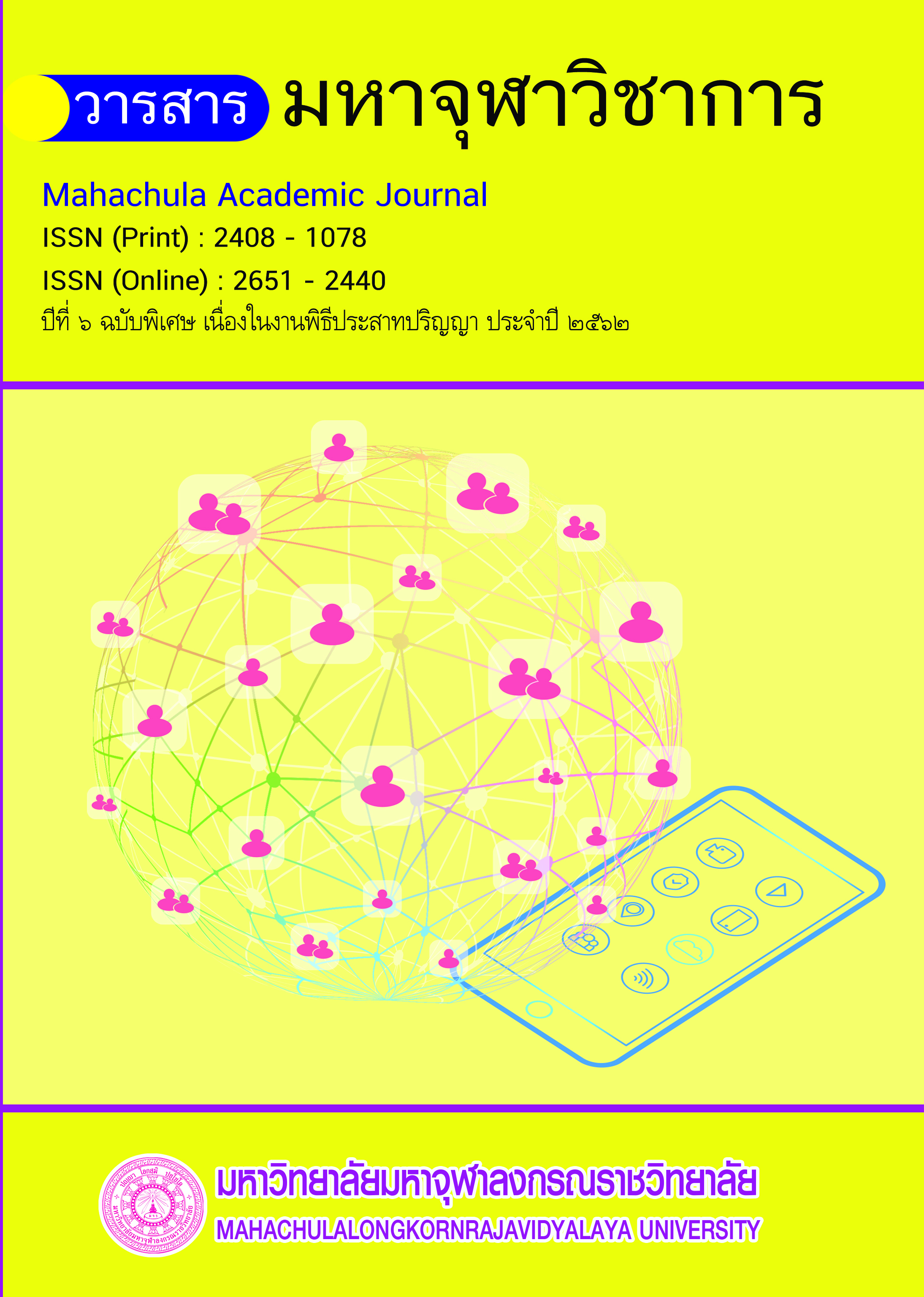An analytical study of Buddhist Ethics and Careers in Buddha’s time
Main Article Content
Abstract
The research title “An analytical study of Buddhist Ethics and Careers in Buddha’s time” of which objectives are to study of the categories of the career in Buddha’s time, Buddhist ethical principles in careers and to apply the Buddhist ethical principles in careers development in the present. The methods of this research work are documentary study by searching the data focus on the concept of Buddhist Ethics and careers in Buddhism in Tipitaka, Commentaries, Sub-commentaries, related research works and analysisall data regarding the Buddhist ethics principles and careers
From the research, it is found that the kinds of various careers in Buddha time has evolved from the beginning of the absence of the cycle of existence of Aeon (Vivatta Kappa) which appears in AggannaSutta. The original occupation was agriculture, from agriculture was developed into industrial society. However, in Buddha time the castes system was strength of which affected to people and occupations. Whatever occupation the people did, it depends on the caste they belong to.
In the Buddhist ethical issue in occupations, it is found that the principles Buddhist ethics is based on His teaching of which the concept of “good or bad” “right or wrong” “should do or should not do” is absolute. When examined the aims, it can divide into two level, viz. 1) Mundane (Lokiya) means Buddhist principles for the house holders and 2) Super- mundane (Lokuttara) means the highest level of Buddhist principles for the noble persons (Ariyapuggala) who practice until getting the wisdom which can lead to destroy the defilement or the circle of birth absolutely. The Buddhist moral judgement is the norm to adjudicate the good or bad of human based on Wholesome actions- i.e. Non-greed (Alodha), Non-hatred (Adosa) and Non-delusion (Amoha), and Unwholesome action –i.e. Greed (Lobha), Hatred (Dosa) and Delusion (Moha) by consideration of the agent’s volition (Cetana) and fruit of Action.
In the issue concerning an application of Buddhist ethical principle in development of careers in present time, is found that careers in Buddha time was connected with religious belief –well-known as the castes –hence social system is not more complicated, while in the present time is more complex. As mentioned above, there are various careers which respond the demand of the people expanded. Then only Buddhist moral judgement which is major criteria to judge careers that “should do or should not do” “good or bad” may not enough, we have to use other criteria to judge i.e. minor criteria –consciousness – and participation criteria –law and code of profession, to find the way out for some careers in present time.
Article Details
References
เดลคาร์เนกี้. วิธีทำงานให้สนุกและสร้างสุขให้ชีวิต. แปลและเรียบเรียงโดย รุจิเลข เลขะวงศ์. กรุงเทพมหานคร : ดุษฎีปัญญา. ม.ป.ป.
ดำรงค์ ฐานดี. สังคมวิทยาอาชีพ. กรุงเทพมหานคร : สำนักพิมพ์มหาวิทยาลัยรามคำแหง, ๒๕๓๕.
ที. ดับบลิว. ริสเดวิดส์. พระพุทธศาสนาในชมพูทวีป. แปลและเรียบเรียงโดย สมัย สิงหศิริ. พระนคร : สภาการศึกษามหามกุฏราชวิทยาลัย, ๒๕๑๕.
พรเพชร วิชิตชดชัย. กฎหมายแรงงาน-คำอธิบาย. กรุงเทพมหานคร: แสวงสุทธิการพิมพ์, ๒๕๓๐.
พระเทพเวที (ป. อ. ปยุตฺโต). รากฐานพุทธจริยศาสตร์สำหรับสังคมไทยร่วมสมัย. กรุงเทพมหานคร: สำนักพิมพ์มูลนิธิโกมลคีมทอง, ๒๕๓๓
พระพรหมคุณาภณ์ (ป. อ. ปยุตฺโต). พจนานุกรมพุทธศาสตร์ ฉบับประมวลศัพท์. กรุงเทพมหานคร: มหาจุฬาลงกรณราชวิทยาลัย, ๒๕๓๖.
พรนพ พุกกะพันธ์. จริยธรรมธุรกิจยุคโลกาภิวัตน์. กรุงเทพมหานคร : จามจุรีโปรดักชั่น, ๒๕๔๖.
มนูญมุกข์ ประดิษฐ์. ทฤษฎีใหม่และเศรษฐกิจพอเพียง. กรุงเทพมหานคร: โรงพิมพ์มหาจุฬาลงกรณราชวิทยาลัย, ๒๕๔๕.
พระสิริมังคลาจารย์. มังคลัตถทีปนี แปล เล่ม ๒. พิมพ์ครั้งที่ ๘. กรุงเทพมหานคร: มหามกุฏราชวิทยาลัย, ๒๕๓๒.
มหาจุฬาลงกรณราชวิทยาลัย. พระไตรปิฎกภาษาบาลี ฉบับมหาจุฬาเตปิฏกํ ๒๕๐๐. กรุงเทพมหานคร: โรงพิมพ์มหาจุฬาลงกรณราชวิทยาลัย, ๒๕๓๕.
มหาจุฬาลงกรณราชวิทยาลัย. พระไตรปิฎกภาษาไทย ฉบับมหาจุฬาลงกรณราชวิทยาลัย. กรุงเทพมหานคร : โรงพิมพ์มหาจุฬาลงกรณราชวิทยาลัย, ๒๕๓๙.
มหาจุฬาลงกรณราชวิทยาลัย. อรรถกถาภาษาบาลี ฉบับมหาจุฬาอฏฺฐกถา. กรุงเทพมหานคร: โรงพิมพ์วิญญาณ, ๒๕๓๓-๒๕๓๔.
มหามกุฏราชวิทยาลัย. พระไตรปิฏกพร้อมอรรถกถา แปล ชุด ๙๑ เล่ม. กรุงเทพมหานคร : โรงพิมพ์มหามกุฏราชวิทยาลัย, ๒๕๓๔.
เรืองอุไร กุศลาศัย. สตรีในวรรณคดีพุทธศาสนา. กรุงเทพมหานคร : สำนักพิมพ์ศยาม, ๒๕๓๕.
วศิน อินทสระ. พุทธปรัชญาถรวาท. พิมพ์ครั้งที่ ๓. กรุงเทพมหานคร : โรงพิมพ์ชวนพิมพ์, ๒๕๓๗.
วิทย์ วิศทเวทย์. จริยศาสตร์เบื้องต้น มนุษย์กับปัญหาจริยธรรม. กรุงเทพมหานคร : อักษรเจริญทัศน์, ๒๕๓๒.
สำนักงานคณะกรรมการวัฒนธรรมแห่งชาติ. สังคมวิทยาตามแนวพุทธศาสตร์. กรุงเทพมหานคร : โรงพิมพ์กรมศาสนา, ๒๕๓๐.
สำนักงานสถิติแห่งชาติ .การจัดประเภทอาชีพตามมาตรฐานสากล .กรุงเทพมหานคร : บริษัท ศรีเมืองการพิมพ์ จำกัด, ๒๕๓๓.
อภิชัย พันธเสน. พุทธเศรษฐศาสตร์ : วิวัฒนาการ ทฤษฎี และการประยุกต์กับเศรษฐศาสตร์สาขาต่างๆ. กรุงเทพมหานคร : สำนักงานกองทุนสนับสนุนการวิจัย (.วกส), ๒๕๔๔.


